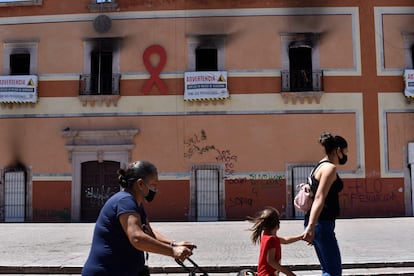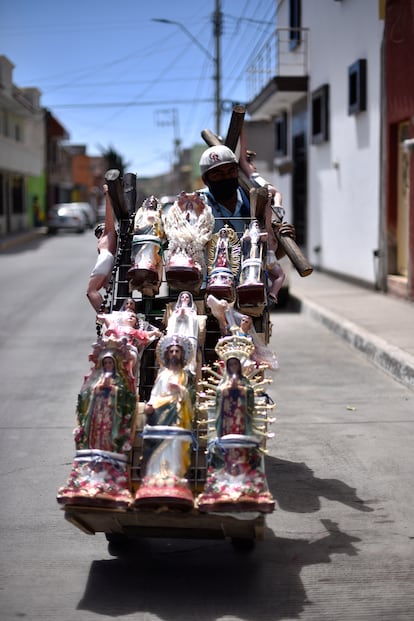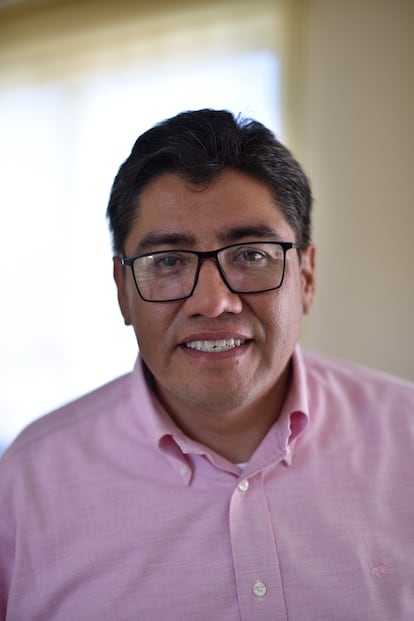Dodging bullets in Fresnillo, Mexico’s city of fear
Afflicted by drug violence, this mining town in the central state of Zacatecas leads national polls for citizens’ lack of confidence in the safety of their surroundings


Sometimes Mariano Rosales has just enough time to lower his grocery store’s metal shutters and lock himself in the cellar with his wife. But there are moments when the bullets start firing so close that the couple just hit the aisle floor, their eyes trained on packs of Doritos. In his 12 years running his store in Fresnillo, in Mexico’s Zacatecas state, Rosales has never been more afraid. “We are scared to death. We spend all day praying to Christ,” said the shopkeeper.
His fears are hardly unfounded. Fresnillo recently received the unwelcome accolade of being named the least safe place in the country according to its own residents, in a survey for Mexico’s national statistics agency. Inter-cartel violence is the top of the city’s concerns as elections loom on June 6.Three weeks ago in front of Rosales’ store, a group of sicarios – hired cartel assassins – killed the city’s deputy director of urban development while he was standing in the door of his own home. A few days earlier a lawyer was shot dead on the same street as he was leaving his office. And one week ago, three more neighbors were shot a couple of blocks down the street. The day the city official was shot dead, 14 other people were murdered in this city of 250,000 souls. Little surprise then that the survey found 95 percent of Fresnillo residents feel living in their city is unsafe.
Fresnillo offers a potent lens with which to understand the wave of violence sweeping the rural states of central Mexico. These areas were relatively calm until a few years ago, as they sit a long way from Mexico’s principal drug entry and production points on the coasts and in the mountains, and from the exits along the northern border with the United States. But in recent years, the area of Mexico’s map affected by organized crime has sprawled wider and wider. Like other central states including Guanajuato, San Luis Potosi and Aguascalientes, Zacatecas has witnessed a grisly rise in violence. In the last year alone, homicides have increased by more than 60%.
Drug routes

Fresnillo’s size and location on a corridor connecting Pacific ports to northern border states caught the eye of the Jalisco New Generation Cartel (CJNG). The CJNG is now the most powerful cartel in Mexico, and has expanded as it seeks to control the distribution networks in the east. Four police officers guarding one of the routes north so coveted by the cartel were ambushed and found burned to death inside their patrol car last week.The city used to be better known for its wealth of gold and silver. Fresnillo has mined these precious metals since Spanish colonial times, and Fresnillo PLC is the only Mexican company currently listed on the London Stock Exchange. Silver is still being mined in the city, and with deposits in the towns of Sonora and Durango, Fresnillo PLC provides more than 10,000 jobs locally. The city is surrounded by desert, but elsewhere giant warehouses appear on its outskirts that house assembly plants for auto parts and other manufactured products.
The miners have not escaped Fresnillo’s wave of violence, though attacks on workers are often blamed on union disputes. “They say it’s the unions, but who knows,” said Miguel Macias, 32, wearing an orange helmet and fluorescent safety vest for work. When he was taking his dog for a walk one morning, he witnessed two men on a motorcycle shoot “a guy who was washing his car outside his house,” he said. That same afternoon, “they found another dead body on the soccer field,” he said grimly.
Saúl Monreal, the mayor of Fresnillo, openly acknowledges the scale of the problem: “The city is in the middle of an all-out war between the cartels,” he said, sitting in a temporary office. Fresnillo’s city council buildings have been closed since a violent protest over the murder of a young girl, which led to demonstrators storming the site and burning several rooms. “They were expressing their anger,” the mayor admitted. He said three cartels – CJNG, Sinaloa and Noreste – operate in the area, but singled out one: “the presence of Jalisco Nueva Generación in the last year is what has exacerbated the violence.”
Even cartel control isn’t new for Fresnillo. At the end of the 2000s, during Mexican President Felipe Calderon’s “war on drugs”, the city was taken over by the Zetas cartel. The regional cartel boss Iván Velázquez, alias Z-50, lived in Fresnillo, and boss Miguel Ángel Treviño, or Z-40, was also a regular. Their arrests in 2012 and 2013 respectively calmed the situation in Fresnillo until the current bloody spike in violence. The arrival of new cartels has also brought increased methamphetamine (meth) consumption, up more than 50% over the last year according to data from Fresnillo’s Juvenile Integration Center (CIJ).

The violence will not escape unnoticed in elections slated for June 6 that will select a new Mexican parliament and governors in 15 of the country’s 32 states, including Zacatecas. Mayor Monreal stressed that the problem of insecurity goes beyond his city’s limits. “The situation is very serious, not only in Fresnillo, but in the whole state. People know that the issue of organized crime goes beyond our jurisdiction. It is state and federal. I have let the president know that.”On February 27, the day that 15 murders were registered in the city, President Andrés Manuel López Obrador visited Fresnillo, and ordered security reinforcements be deployed to the state in the form of more than 300 members of the army and the National Guard. The president is hoping to unseat the governor from the Institutional Revolutionary Party (PRI) and hand control to the party he founded, the National Regeneration Movement (Morena). Mayor Monreal belongs to the Morena party.’
Fresnillo is the cradle of the Monreal family, almost half of whose 14 siblings are in politics, giving birth to the term “Monrealismo”. The eldest, Ricardo Monreal, 60, is a senator and one of Morena’s heavyweights. “To do away with Monrealismo is to do away with society, with the butcher, with the shoe shiner, with the shopkeeper,” said Mayor Saúl Monreal. His brother David is Morena’s candidate for governor, after also serving as Fresnillo’s mayor.
The Monreal family’s political dominance has been criticized inside and outside Morena. The influential family promoted Catalina Monreal, daughter of Ricardo, as candidate for state president. Saúl, who is Catalina’s uncle, said: “They have their people, we have ours. We are trying to reconcile.”Their critics say the family doesn’t represent the social justice message that the president wants to emphasize. Before the creation of Morena, Benjamin Medrano was part of the Monreal team in Fresnillo. Today a lawmaker for PRI and also a former mayor, he said that the family’s brand “is not the same as that of Morena. “‘Monrealismo’ is disguised as a social movement, but it is not genuine like López Obrador’s.” He accuses the family of trying to rule the state as its own fiefdom, and believes the PRI can triumph over David Monreal for the governorship of the state. Medrano claims David Monreal was tainted by a cattle ranching corruption scandal in 2019, for which Medrano says he has not been forgiven. Whatever lies ahead for Zacatecas, its citizens want to know when they can stop feeling afraid.
Tu suscripción se está usando en otro dispositivo
¿Quieres añadir otro usuario a tu suscripción?
Si continúas leyendo en este dispositivo, no se podrá leer en el otro.
FlechaTu suscripción se está usando en otro dispositivo y solo puedes acceder a EL PAÍS desde un dispositivo a la vez.
Si quieres compartir tu cuenta, cambia tu suscripción a la modalidad Premium, así podrás añadir otro usuario. Cada uno accederá con su propia cuenta de email, lo que os permitirá personalizar vuestra experiencia en EL PAÍS.
¿Tienes una suscripción de empresa? Accede aquí para contratar más cuentas.
En el caso de no saber quién está usando tu cuenta, te recomendamos cambiar tu contraseña aquí.
Si decides continuar compartiendo tu cuenta, este mensaje se mostrará en tu dispositivo y en el de la otra persona que está usando tu cuenta de forma indefinida, afectando a tu experiencia de lectura. Puedes consultar aquí los términos y condiciones de la suscripción digital.








































